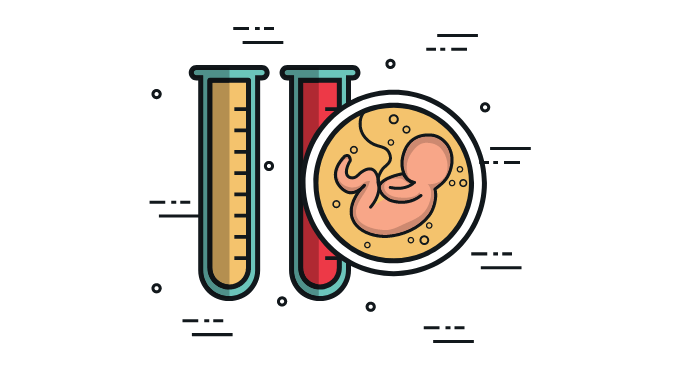In recent years, advancements in medical science have brought about significant changes in how we address infertility issues. One such development is the concept of a “test tube baby,” a term that refers to a child conceived through in vitro fertilization (IVF). But how does Islam view this modern medical procedure? Understanding the perspectives and implications of test tube babies in Islam is essential for Muslims considering this path to parenthood.
What is Test Tube Baby?
Sometimes, a woman’s uterine tubes are closed, Reproductive material cannot be matched due to tightness, or any disease cannot cause pregnancy In this case.
The doctor takes the man’s sperm and the woman’s eggs and mixes them in a tube instead of the woman’s uterus. This is called a “test tube baby. “
Concept of Test Tube Baby in Islam
When this process, which was impossible in the woman’s womb, is completed, it is transferred to the mother’s womb to complete the following steps.
It has been decided that this act is done out of compulsion, so it is permissible according to Shari’ah, but with the condition that the sperm and eggs belong to the spouses.
On the other hand, if this union is performed between a couple who are not married to each other, it will be equivalent to adultery, and the child to be born will also be haraam.
A test tube baby is a treatment when a man’s sperm cannot reach a woman’s egg due to a defect or complication in a man or woman, and because of this, it is not possible to give birth naturally.
When the male sperm is fertilized in the laboratory, it develops like a normal pregnancy, and the baby is born after nine months.
History First Test Tube Baby

- The world’s first test tube baby was born in Britain; people refused to believe it was true, and it was heavily criticized.
- Subhash Mukhopadhyay, who gave birth to India’s first test tube baby, got fed up after constant criticism and harassment and eventually committed suicide.
- The world’s third test tube baby was born in Australia.
- Pakistan’s first test tube baby was born when the baby’s father came to the doctor and said that the doctor was reading this news and my father (the baby’s grandfather) was asking that you did not do this haraam thing.
According to a ruling of the Pakistani Shari’ah Court, “If the sperm that causes the birth of a child belongs to his legal father and the egg belongs to his mother, who is the wife of the man concerned, then medical procedure is required.”
Suppose the embryo is placed in the womb of the birth mother of the child again after having an artificial pregnancy. In that case, this medical procedure will be religiously lawful and lawful.
When the world’s first test tube baby was born in 1978, Al-Azhar University in Egypt issued a fatwa in 1980 stating that if the eggs used in IVF belonged to the wife and the sperms belonged to the husband, The child to be born would be lawful and by the law.
Types Of Test Tube Babies
There are seven cases of breeding through test tube babies:
- The husband’s sperm should be delivered to the appropriate place in the womb of his wife through injection, etc.
- The husband and his wife’s fertile material should be obtained and reared in a tut for a certain period and then transferred to the womb of the same wife.
For childless couples, these two conditions are permissible for procreation. Provided that the husband himself performs the transfer from the womb of the wife, and if the husband is unfamiliar with the procedure, the lady doctor performs the task.
It is not permissible to get these methods from a male doctor other than the husband (although the children will be halal).
- The husband and wife’s reproductive material should be obtained, and their mixture should be transferred to the womb of the same husband’s second wife.
This situation has been declared illegitimate by some scholars, and some scholars have allowed it on the condition that the first wife is not capable of procreation or she cannot bear motherhood.
If the first wife is medically capable of procreation, And even if she can afford motherhood, she is not allowed to do so.
- The substances of the husband and a stranger should be mixed, and after their delivery, they should be transferred to the womb of the husband’s wife.
- The sperm of someone other than the husband and the reproductive material of the wife should be nurtured together And let their mixture be transferred to the womb of the husband’s wife.
- By cultivating the sexual substances of husband and wife, It should be transferred to the womb of a third stranger.
- A foreign man and woman should be nurtured together and transferred to his wife’s womb.
These four forms are forbidden and haraam.
Islamic Perspectives on Test Tube Babies
The Importance of Parenthood in Islam
In Islam, having children is seen as a blessing and a means to continue one’s lineage. Parenthood is highly valued, and Muslims are encouraged to seek permissible ways to have children if they face infertility.
Islamic Rulings on Assisted Reproductive Technologies
Islamic scholars have extensively discussed the permissibility of assisted reproductive technologies (ART), including IVF. The consensus is that IVF is permissible under certain conditions:
- The sperm and egg must come from the married couple.
- The fertilized embryo must be implanted in the wife’s uterus.
- Third-party involvement, such as donor sperm or eggs, is generally prohibited.
Ethical Considerations
Muslim scholars emphasize maintaining the sanctity of marriage and lineage. Therefore, any procedure that compromises these principles is discouraged. IVF is considered permissible when conducted within the framework of a lawful marriage and without involving third parties.
Addressing Common Concerns
Legitimacy and Lineage
One of the primary concerns in Islamic discourse regarding IVF is the issue of legitimacy and lineage. Islam places great importance on the purity of lineage; thus, the process must ensure no mixing of lineages.
The Role of Intention
In Islam, intention (niyyah) plays a crucial role in determining the permissibility of actions. Couples undergoing IVF to fulfil their desire for children within the bounds of Shariah are generally supported by scholars.
Experience and Guidance from Islamic Scholars
Islamic scholars provide guidance based on the principles of the Quran and Hadith. Their experience and knowledge help ensure that the procedures align with Islamic values. Couples are encouraged to consult knowledgeable scholars to understand IVF’s ethical and religious implications.
The Process of IVF: Step-by-Step
Initial Consultation
- Couples meet with a fertility specialist to discuss their medical history and the IVF process.
- A thorough examination is conducted to determine the best course of action.
Ovarian Stimulation
- The mother receives hormonal treatments to stimulate egg production.
- Multiple eggs are collected to increase the chances of successful fertilization.
Egg Retrieval and Fertilization
- Eggs are retrieved from the mother’s ovaries using a minor surgical procedure.
- Sperm from the father is collected and used to fertilize the eggs in the laboratory.
Embryo Transfer
- Once fertilized, the embryos are monitored for a few days.
- The healthiest embryos are selected and implanted into the mother’s uterus.
Pregnancy and Follow-Up
- After implantation, the mother is monitored for signs of pregnancy.
- Regular follow-up appointments ensure the health and well-being of both mother and baby.
Frequently Asked Questions
Is IVF Permissible in Islam?
Yes, IVF is permissible in Islam as long as it involves the married couple’s sperm and eggs and is performed within the wife’s womb without third-party involvement.
What is the Islamic Ruling on Using Donor Sperm or Eggs?
Using donor sperm or eggs is generally not permissible in Islam as it can lead to issues with lineage and inheritance, which are strictly protected in Islamic law.
Can a Muslim Couple Use Surrogacy?
Surrogacy is a contentious issue in Islam. Most scholars prohibit it because it involves a third party, which can complicate matters of lineage and inheritance.
How Should a Muslim Couple Approach IVF?
Muslim couples should approach IVF with clear intentions, ensuring they adhere to Islamic principles. Consulting with knowledgeable scholars and medical professionals is advised.
Conclusion
Understanding the concept of a test tube baby in Islam requires a careful examination of religious principles and ethical considerations. While Islam permits the use of IVF under specific conditions, couples must approach the process with the right intentions and seek guidance from both medical professionals and Islamic scholars. By doing so, they can fulfil their desire for parenthood while remaining true to their faith.
See From Us:
